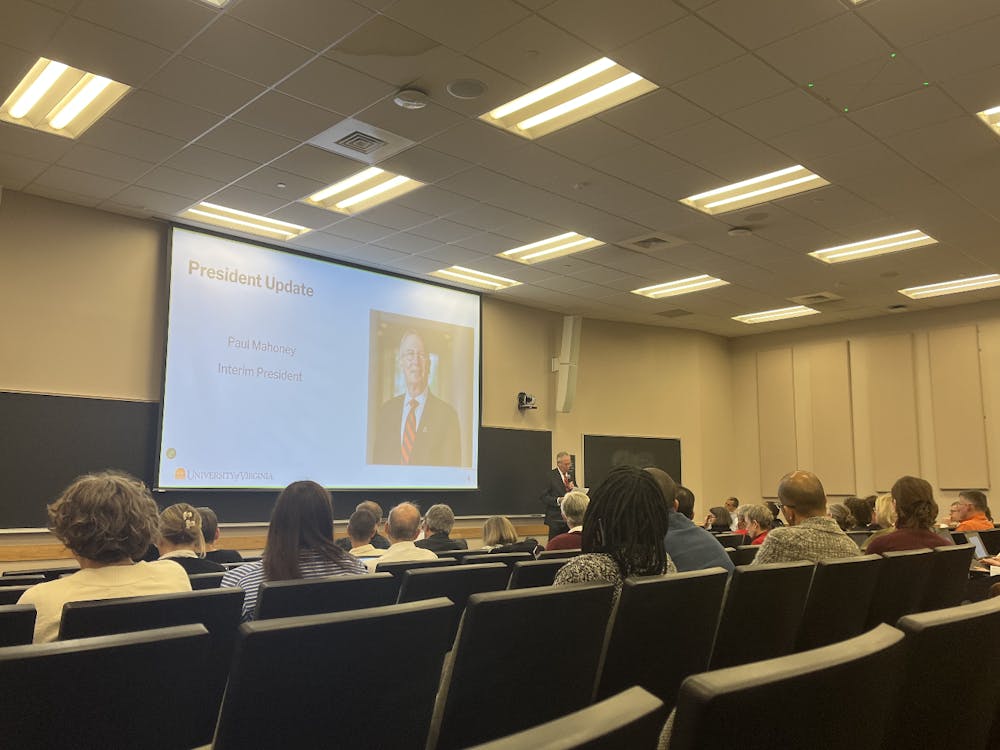As the semester comes to a close, the search for a new dean of the University's College and Graduate School of Arts & Sciences is just beginning. Many in the administration say filling the position will require a candidate equipped not only to oversee the academic program, but to spearhead fundraising efforts as well.
Current Dean Ed Ayers announced Nov. 17 that he will be leaving his post to assume the presidency of the University of Richmond effective July 1.
Ayers's departure comes just months after the public kickoff of the University's ambitious $3 billion Capital Campaign. The dean is especially involved in securing fundraising commitments for the South Lawn Project, a $125 million expansion effort which will eventually result in new facilities housing the politics, history and religious studies departments, among others.
In his report to the Faculty Senate earlier this week, University President John T. Casteen, III, stated that he and Provost Gene Block are currently co-chairing the search committee for a new dean.
"Gene and I have considerable travel obligations," Casteen said at the meeting, adding that a member of the search committee will need to be someone who can spend the majority of his or her time on Grounds. The president said he and Block hope to have a search committee formed by mid-January.
Casteen's busy travel schedule underscores the growing significance of fundraising efforts to administering a University in today's environment. In a 1999 New York Times Magazine article, Casteen recalled how his own presidency evolved to include more development responsibilities. When he assumed the University presidency in 1990 he spent three days a week on Grounds and taught. By 1993, however, the Board of Visitors instructed him to devote nearly all of his time to fundraising.
Increasingly, the same pressures that forced administrators like Casteen out of the classroom are also affecting administrators whose jobs have traditionally been internal and academically oriented. This will play a role in the search for a new dean of the College and Graduate School of Arts & Sciences. Casteen said in his remarks Wednesday that in recent years the work of the College dean has become heavily committed to fundraising in addition to academic planning and leadership.
"In the past the job was intellectual leadership, in the past the dean had budgetary responsibility but it wasn't so complicated, and in addition there's this whole fundraising thing that didn't used to be," Assoc. College Dean Richard Handler said.
As both a dean and history professor, Ayers managed to carry on significant academic responsibilities including a large undergraduate lecture course, advising graduate students and writing.
Handler added that the dual roles of the job may make it more difficult to find a successor.
According to Casteen, he and Block have been meeting with various groups "that have some perspective on the job itself," such as the College Foundation -- a group founded in 2001 to support the College -- in order to understand the role of the dean and add additional members to the committee.
Casteen added that on their agenda is the formation of a list of various issues that need to be addressed in the form of both opportunities and challenges during the first five-year term of the new dean's appointment.
Casteen noted that while "this deanship is arguably the most prominent deanship in the country," the role of dean has become more complex in that "the job at this point resembles that of a small college president [rather] than a dean."
Ayers noted that the state's budget crisis at the beginning of his term forced him to address fundraising from the outset. The South Lawn project has also always been a main focus.
"I've been in campaign mode the whole time I've been in the deanship," he said.
Ayers noted that funding for the College has always been a necessity in order to maintain "the degree of excellence" the University hopes to uphold.
Ayers predicted the next dean will need to continue this union of academia and financial responsibility.
They will need "to really take the College to the next level of excellence, and that means hiring a lot of great faculty, which we will be doing, taking care of [the] great faculty we have now and succeeding for the college in the campaign."
Marlene Ross, director of the American Council on Education Fellows Program, also noted the additional financial responsibilities, citing declining state support as a factor in the evolving role of deans.
While deans in private institutions have long been responsible for leading fundraising efforts, this duty emerges as a recent trend among deans of public universities, according to Ross.
"With the recent declining state support for our public universities, more of the public university deans are involved," Ross said.
Ross added that for large institutions, deans are responsible for maintaining contacts in the national and global communities who may aid in fundraising efforts.
"For a place like U.Va., which is a national institution, the community is large, so [the job involves] reaching out beyond Charlottesville and beyond Virginia," Ross said. A dean must "make contacts, and maintain contacts to groom donors to maintain relationships with potential donors and with donors. They could be anywhere because U.Va. has alumni all over the world and you recruit from a national level."
According to Handler, the search committee will need to take into account the dean's development role as they consider candidates.
"I think they're going to be looking for somebody that has experience with that," he said. "If you don't bring in an outside administrator, if you elevate one of your administrators, they might not have that [financial] experience. [They'll] look for someone that has the personality and energy to do it."
Ayers agreed that the new dean will need to have this certain level of stamina.
"The person needs a lot of energy and durability and patience and a sense of humor, not necessarily in that order," he said.






